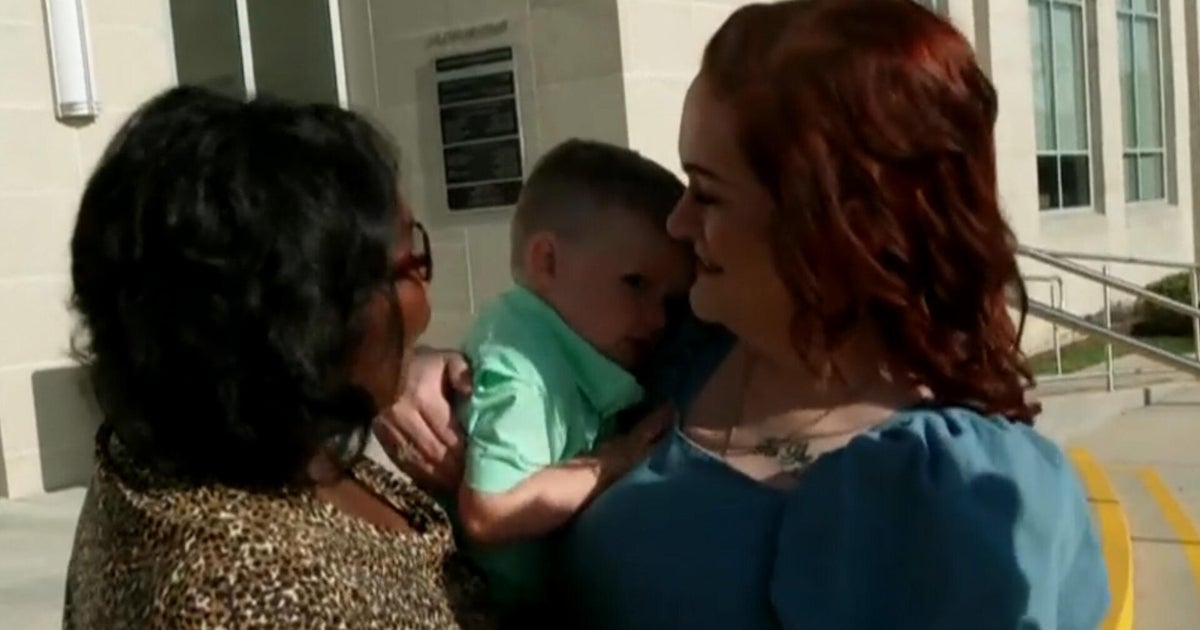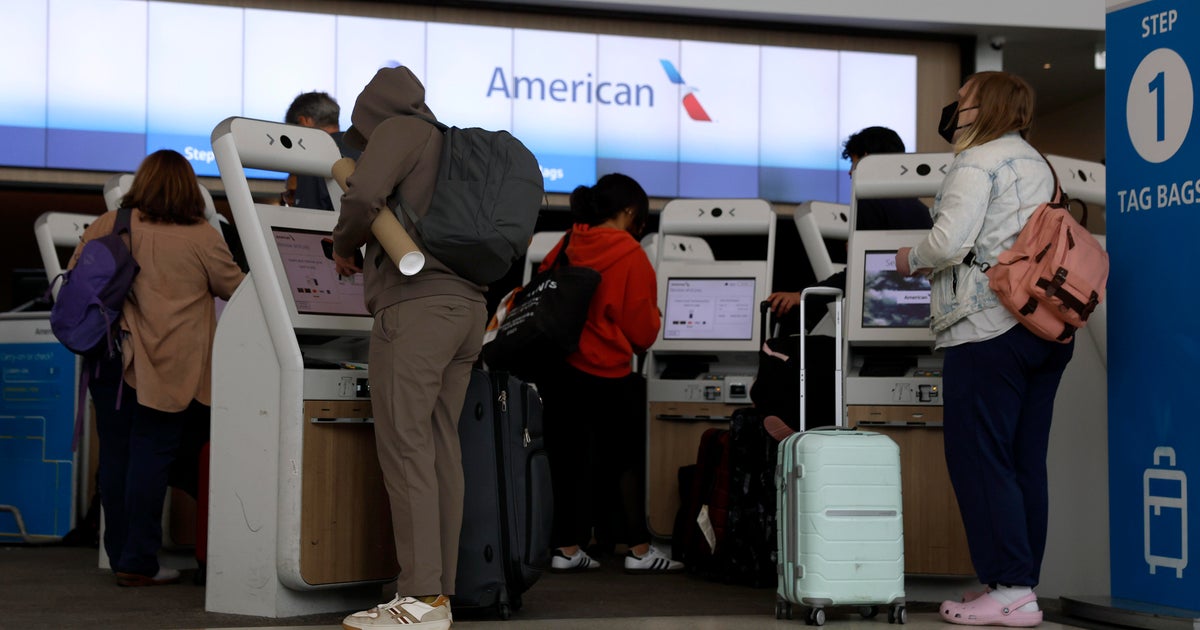Israel's government approved plans on Monday for its forces to capture the entire Gaza Strip and remain in the territory for an unspecified amount of time, two Israeli officials told The Associated Press. The plans appear set to vastly expand Israel's operations in the war-torn Palestinian territory, and they're likely to bring fierce international opposition.
Israeli Cabinet ministers approved the plan in an early morning vote, just after the Israeli military chief said the army was calling up tens of thousands of reserve soldiers for an expanded assault on the strip.
The news came hours after a Sunday Houthi missile strike targeted Tel Aviv's Ben-Gurion airport for the first time since the war began, briefly halting flights and lightly wounding four people. Israeli officials quickly vowed to respond.
Israel's expansion plan, which the officials told the AP is meant to help achieve the country's war aims of defeating Hamas and freeing hostages still held in Gaza, would push hundreds of thousands of Palestinians into southern Gaza, exacerbating an already dire humanitarian crisis in the enclave.
In a video message posted Monday on social media, Prime Minister Benjamin Netanyahu did not confirm the intention for Israel's military to seize control of the entire strip, but he said the operation would be "intensive," and that Gaza's "population will be moved, for its own protection."
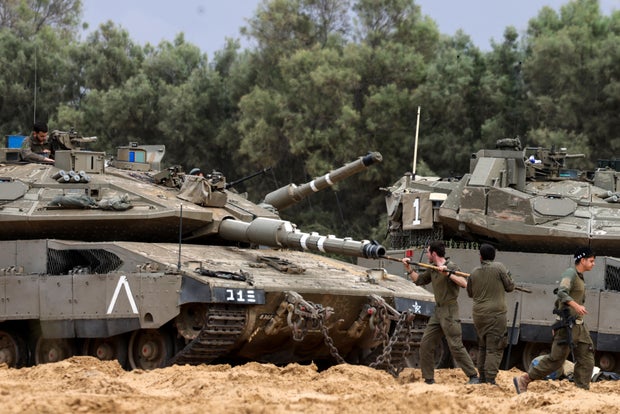 Israeli soldiers clean the gun of a tank at a position near Israel's border with the Gaza Strip, May 4, 2025.
MENAHEM KAHANA/AFP/Getty
Israeli soldiers clean the gun of a tank at a position near Israel's border with the Gaza Strip, May 4, 2025.
MENAHEM KAHANA/AFP/Getty
The European Union was among the first international entities to voice concern over the prospect of expanded Israeli military operations in Gaza, with spokesman Anouar el-Anouni saying an escalation would "result in further casualties and suffering for the Palestinian population," and urging Israeli forces "to exercise the utmost restraint," according to the French news agency AFP.
Since a ceasefire between Israel and Hamas collapsed in mid-March with a renewed Israeli assault, the Israel Defense Forces have unleashed fierce strikes on the territory that have killed hundreds. The IDF has captured swathes of territory and now controls roughly half of Gaza. Before the truce ended, Israel halted all humanitarian aid into Gaza, including food, fuel and water, setting off what is believed to the be the worst humanitarian crisis in nearly 19 months of war.
The ban on aid has prompted widespread hunger and shortages have set off looting, according to aid agencies that work in the enclave.
Israel discussing Trump's controversial Gaza plan with other nationsThe Israeli officials said the plan included the "capturing of the strip and the holding of territories."
With the plan, the officials said Israel also wants to keep Hamas from distributing humanitarian aid in the enclave it's controlled for nearly two decades, which Israel says strengthens its rule over Gaza. Israeli officials have accused Hamas of keeping aid materials for itself, to bolsters its capabilities. The plan also includes more powerful strikes against Hamas targets, the officials said.
They added that Israel was in touch with several countries about President Trump's plan for the U.S. to "take over" Gaza and relocate its population of about 2 million Palestinians. Israeli officials have said it will entail "voluntary emigration," but the suggestion that so many civilians could be moved out of the territory has sparked condemnation from Israel's allies in Europe, and from its Arab neighbors, who Mr. Trump said would take in the relocated masses.
One of the officials told the AP the plan would be implemented gradually. Both officials spoke on condition of anonymity because they were discussing secret military plans.
Israel has tried for weeks to ratchet up pressure on Hamas to show more flexibility in ceasefire negotiations. But international mediators trying to bring the sides toward a new deal have struggled to do so. Israel's measures — most notably the ongoing strikes and the complete blockade on aid and other materials entering Gaza — do not appear to have moved Hamas away from its negotiating positions. The group, long designated a terrorist organization by Israel, the U.S. and the European Union, has demanded that Israel agree to a complete withdrawal from Gaza as part of any lasting ceasefire.
The previous ceasefire was meant to lead the sides to negotiate an end to the war, but that goal has been a repeated sticking point in talks between Israel and Hamas. Israel says it won't agree to end the war until Hamas is defeated.
Israel's announcement of an expansion of military operations angered families of the remaining Israeli hostages. The Hostage Families Forum, which supports the families, said Monday that the plan puts every hostage at risk and urged Israel's decision-makers to secure a deal that prioritizes the hostages, as many as 24 of whom Israeli officials believe are still alive.
At a committee meeting of Israeli lawmakers on Monday, Einav Zangauker, whose son Matan is among the hostages still in Gaza, called on soldiers "not to report for reserve duty for moral and ethical reasons."
The Israeli officials did not disclose details of how the plan seeks to prevent Hamas from involvement in aid distribution. One said the ministers had approved "the option of aid distribution," without elaborating.
Private security to control Gaza aid?
According to an internal memo circulated among aid groups and seen by the AP, Israel has told the United Nations that it will use private security companies to control aid distribution inside Gaza. The U.N., in a statement Sunday, said it would not participate in the plan as it was presented, saying it violates its core principles.
The memo, sent to aid organizations on Sunday, detailed notes from a meeting between the Israeli defense body in charge of coordinating aid for Gaza, COGAT and the U.N.
Under COGAT's envisioned plan, all aid would enter Gaza through the southern Kerem Shalom crossing, including approximately 60 trucks per day, although the convoys' contents were not made clear, nor were how many people would have access to the aid coming in. Previously, the U.N. and other aid providers have said hundreds of trucks per day are needed to bring food and other vital materials into Gaza.
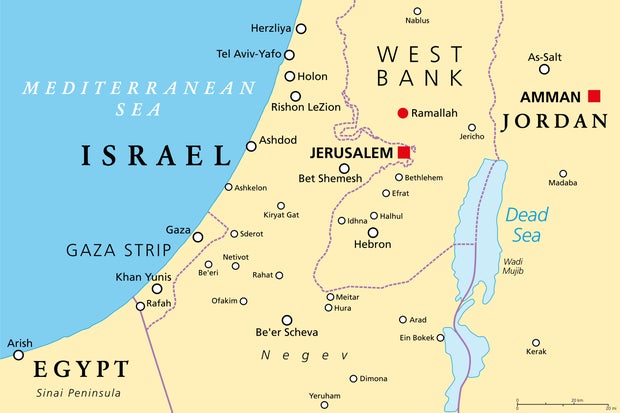 A map shows southern Israel, the Gaza Strip and surrounding countries, including the location of the Rafah border crossing from Gaza into Egypt's Sinai peninsula. The Kerem Shalom crossing between Israel and Gaza sits at the far southern corner of the Palestinian territory.
Getty/iStockphoto
A map shows southern Israel, the Gaza Strip and surrounding countries, including the location of the Rafah border crossing from Gaza into Egypt's Sinai peninsula. The Kerem Shalom crossing between Israel and Gaza sits at the far southern corner of the Palestinian territory.
Getty/iStockphoto
The memo said the aid would be distributed at logistics hubs run by private security companies, and that facial recognition would be used to identify Palestinians at the hubs and SMS alerts would be used to notify people in the area that they could come to collect aid.
Aid workers say the plan to centralize aid, rather than delivering it to Palestinians where they are, will forcibly displace more people. The fighting has already displaced more than 90% of Gaza's population, often multiple times, and turned much of Gaza into an uninhabitable moonscape.
The U.N. said the plan would leave large parts of the population, including the most vulnerable, without supplies. It said the plan "appears designed to reinforce control over life-sustaining items as a pressure tactic — as part of a military strategy."
In a statement on Monday, Hamas said it firmly rejected the Israeli plan to control aid distribution, calling it a plan "to turn aid into a tool for political blackmail or subject it to Israel's conditions," which it said "constitutes a violation of international law and an extension of the starvation policy."
The memo says the U.S. government has voiced clear support for Israel's plan, but it's unclear who would provide funding for the private military companies or the aid. COGAT and the U.S. Embassy in Jerusalem did not immediately respond to a request for comment.
Israeli officials have repeatedly denied a humanitarian crisis in Gaza and said there is sufficient food in the territory, blaming Hamas for failing to distribute it to civilians.
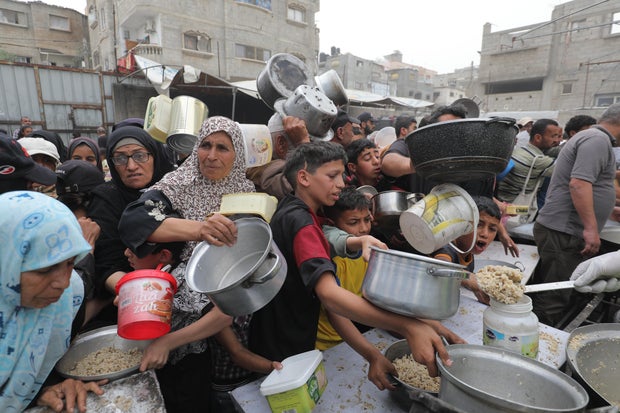 Palestinians wait in long lines with empty pots to get a warm meal distributed by charitable organizations, in Nuseirat camp, northeast of Deir al-Balah, Gaza, April 23, 2025.
Moiz Salhi/Anadolu/Getty
Palestinians wait in long lines with empty pots to get a warm meal distributed by charitable organizations, in Nuseirat camp, northeast of Deir al-Balah, Gaza, April 23, 2025.
Moiz Salhi/Anadolu/Getty
Earlier this week, The Associated Press obtained dozens of documents about aid groups' concerns that the aid distribution hubs could end up permanently displacing Palestinians and forcing them to live in "de facto internment conditions."
Capturing and potentially occupying Gaza again for an indefinite period would not only further dash hopes for Palestinian statehood, it would embed Israel inside a population that is deeply hostile to it and raise questions about how Israel plans to govern the territory, especially at a time when it is considering how to implement President Trump's vision to take over Gaza.
Israel launched its war in Gaza in response to the Hamas-led Oct. 7, 2023 terrorist attack on southern Israel, during which 1,200 people were killed and 251 were taken as hostages back into Gaza. The Israeli offensive has killed more than 52,000 people in Gaza, many of them women and children, according to Palestinian health officials in the Hamas-ruled territory, who do not distinguish between combatants and civilians.
Israel occupied Gaza during a war in 1967 but withdrew troops and settlers from the enclave in 2005. Two years later, Hamas took over and has controlled the territory since.
Crisis in the Middle East More More




